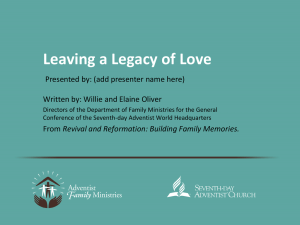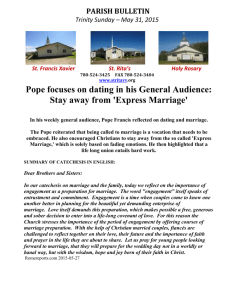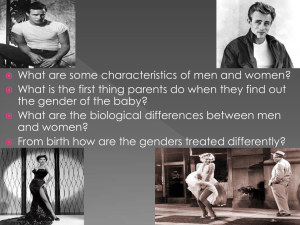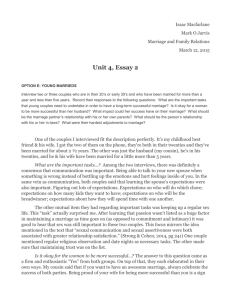The Splendor of Marital Love, by Fr. Jacob Strand
advertisement
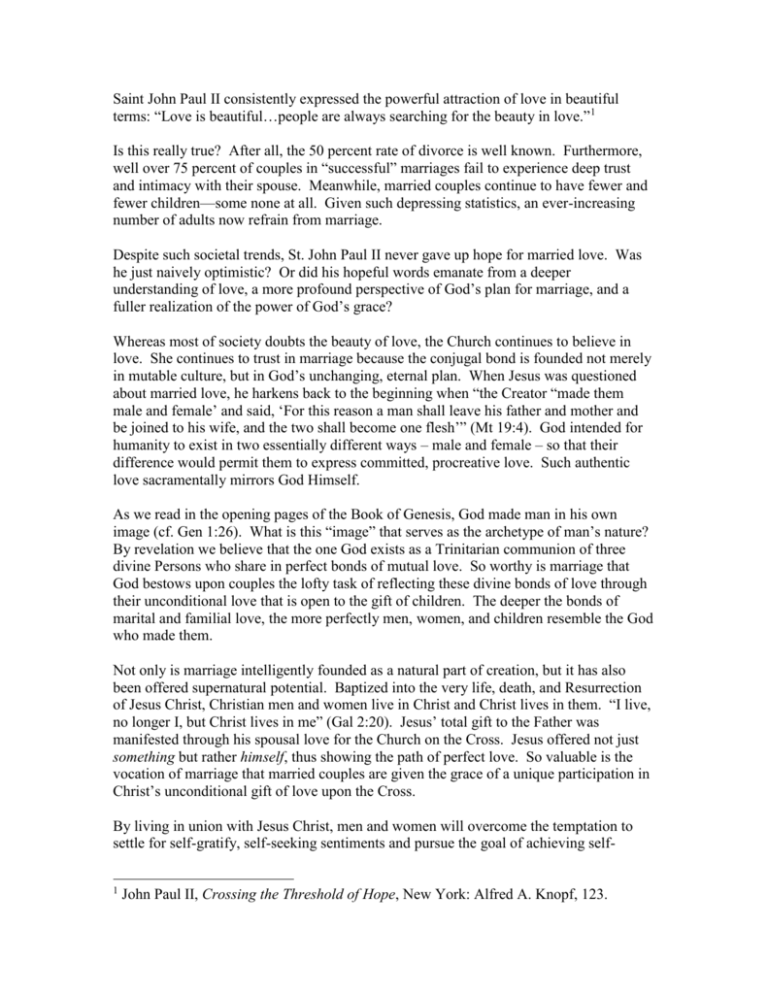
Saint John Paul II consistently expressed the powerful attraction of love in beautiful terms: “Love is beautiful…people are always searching for the beauty in love.”1 Is this really true? After all, the 50 percent rate of divorce is well known. Furthermore, well over 75 percent of couples in “successful” marriages fail to experience deep trust and intimacy with their spouse. Meanwhile, married couples continue to have fewer and fewer children—some none at all. Given such depressing statistics, an ever-increasing number of adults now refrain from marriage. Despite such societal trends, St. John Paul II never gave up hope for married love. Was he just naively optimistic? Or did his hopeful words emanate from a deeper understanding of love, a more profound perspective of God’s plan for marriage, and a fuller realization of the power of God’s grace? Whereas most of society doubts the beauty of love, the Church continues to believe in love. She continues to trust in marriage because the conjugal bond is founded not merely in mutable culture, but in God’s unchanging, eternal plan. When Jesus was questioned about married love, he harkens back to the beginning when “the Creator “made them male and female’ and said, ‘For this reason a man shall leave his father and mother and be joined to his wife, and the two shall become one flesh’” (Mt 19:4). God intended for humanity to exist in two essentially different ways – male and female – so that their difference would permit them to express committed, procreative love. Such authentic love sacramentally mirrors God Himself. As we read in the opening pages of the Book of Genesis, God made man in his own image (cf. Gen 1:26). What is this “image” that serves as the archetype of man’s nature? By revelation we believe that the one God exists as a Trinitarian communion of three divine Persons who share in perfect bonds of mutual love. So worthy is marriage that God bestows upon couples the lofty task of reflecting these divine bonds of love through their unconditional love that is open to the gift of children. The deeper the bonds of marital and familial love, the more perfectly men, women, and children resemble the God who made them. Not only is marriage intelligently founded as a natural part of creation, but it has also been offered supernatural potential. Baptized into the very life, death, and Resurrection of Jesus Christ, Christian men and women live in Christ and Christ lives in them. “I live, no longer I, but Christ lives in me” (Gal 2:20). Jesus’ total gift to the Father was manifested through his spousal love for the Church on the Cross. Jesus offered not just something but rather himself, thus showing the path of perfect love. So valuable is the vocation of marriage that married couples are given the grace of a unique participation in Christ’s unconditional gift of love upon the Cross. By living in union with Jesus Christ, men and women will overcome the temptation to settle for self-gratify, self-seeking sentiments and pursue the goal of achieving self1 John Paul II, Crossing the Threshold of Hope, New York: Alfred A. Knopf, 123. giving, self-sacrificing spousal union. The love the unites men and women and any children that God may give them permanently and unconditionally is given perpetually from our crucified and risen Lord. Married love is called to drink abundantly from the wellsprings of His grace so as to witness the magnificence of love to the world. Have young men and women ever heard this beautiful plan for married life? Many have not. Others have heard it, but never have witnessed it lived concretely. For this reason, many men and women continue to fear that this plan is merely a dream unfounded in reality. The Church in the Archdiocese of Milwaukee wishes to permit God’s powerful grace to shatter these debilitating doubts so as to free couples to experience the fruits of God’s plan for marriage and family life. She wants men, women, and children to know and experience the beautiful plan to which they have been called. In the deepest caverns of their hearts, people desire committed, fruitful love. While sentimental, spontaneous love may attract temporarily, only deep, lasting love fails to satisfy the unquenchable longings of the human heart. By God’s grace, the Church continues to believe in the truth of marital love – love that is free, permanent, faithful, and procreative. Bonded in the Sacrament of Marriage, the Church also believes that the inevitable trials, difficulties, and challenges are transformed into opportunities to polish the bond of married, familial love so that it shines more beautifully day after day. Indeed, with Saint John Paul II, the Church believes that “love is beautiful” and that the restless search for love is naturally found in marriages and families.
